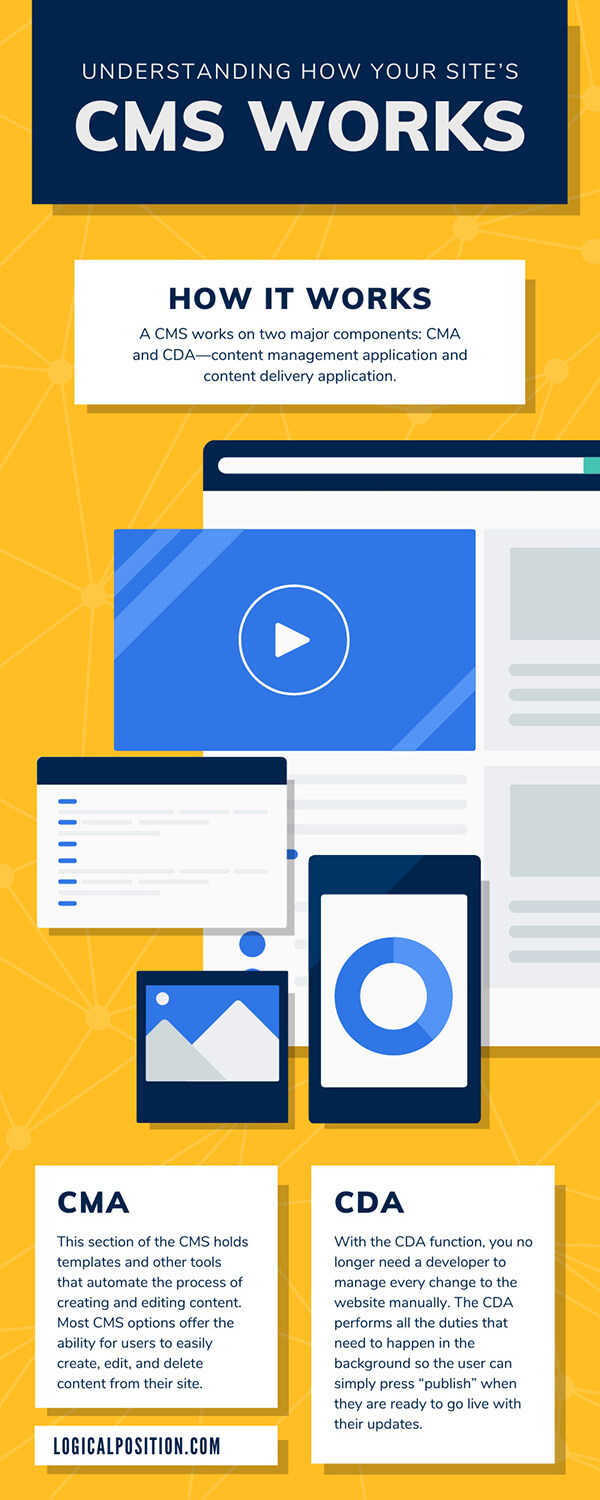Every business needs a website. Websites increase the online visibility of a brand and allow consumers to research and gain confidence in its legitimacy before converting. A website is an investment, and it is something that needs frequent maintenance.
There are many options for creating a website, but the best choice for most applications is a CMS; developing an understanding of how your site’s CMS works can help you make the leap.
How It Works
A content management system or CMS is the current standard for websites. It is an application used to manage websites and their content. A CMS works on two major components: CMA and CDA—content management application and content delivery application. How a CMS works is by providing users the opportunity to:
- Create content
- Store content
- Manage the account and site
- Publish content to live on the internet
A CMS is capable of many more complex things. These are the tenants of every CMS.
CMS is widely revered as the standard in website development because of its unique user-friendly outline and accessible collaboration features that allow for site customization and data collection.
CMA
The content management application component of the CMS is the front end of it. This section of the CMS holds templates and other tools that automate the process of creating and editing content. Most CMS options offer the ability for users to easily create, edit, and delete content from their site.
Here are a few benefits of the CMA:
- Allows for content editing with ease
- No need for coding
- User-friendly
- Direct content work
The CMA is the part of a CMS that allows users to add, remove, and manage any and all content on the website.
CDA
The content delivery application part of a CMS is the backend element. It is the CMS version of a website administrator. With the CDA function, you no longer need a developer to manage every change to the website manually.
While using a developer is still a best practice (even on a CMS site), the CDA works so you can update your site without waiting for manual coding changes to apply them to the live website. Instead, the CDA performs all the duties that need to happen in the background so the user can simply press “publish” when they are ready to go live with their updates.
Why It’s the Right Choice
Choosing a content management system for your website is the best choice, as the digital world and expectations of the consumers continue to shift at a rapid pace. While each CMS holds unique features, all of them provide better range for editing your site than traditional HTML coding.
Choosing to build your site using a CMS is the best option for most business owners. Online visibility is becoming increasingly important for companies and having a top-tier website that you can update regularly with ease is essential. Here are a few critical defining features of a CMS that benefit your brand.
No Coding Required
With a CMS, there is no need to rush to your professional website developer every time a heading or bullet point needs fixing. Instead, a CMS provides a user-friendly setup that allows you to edit your site’s content without any prior knowledge of coding or HTML.
It is still beneficial to hire a professional website developer to build out a new site or redesign an existing one. Still, you can now make more superficial adjustments on your own in no time at all.
Bonus: It is possible to install extensions to help your marketing efforts and tracking without coding, but adding custom code for a granular approach is still an option many choose.
User-Friendly
The most significant draw of using a CMS for website needs is user-friendliness. When using a CMS, you enjoy the ease of a “drag and drop” type of setup with the prestige of a state-of-the-art site. Most CMS platforms provide users with a variety of pre-designed templates to use for their websites. Users can select a template and customize it or even build their own.
Bonus: When choosing a CMS, look for one that offers the opportunity to build a site with responsive design. This type of template ensures your site adjusts to the size of any screen, which dramatically improves the user experience for your customers.
Collaborative
With a CMS, it is simple to share access to the backend work of the site. This is hugely beneficial to businesses, as the website owner can make changes, as can the website developer and any outside marketers the company works with.
Here are a few examples of people who may need access to your CMS:
- The website owner
- An IT professional
- Website developers
- Marketing team
What else makes a CMS collaborative besides multiple user options? CMS platforms offer pre-built features that help companies track their online sales, search engine rankings, and chart movements. This is essential for businesses investing in their search engine optimization, pay-per-click ads, and more.
Easy To Update
With a CMS platform, it is easy to keep your website up to date. The expectations of consumers online change rapidly, and trends fly by at rapid speeds. Keeping up with the Joneses is more challenging now than ever before, but CMS systems make this goal more attainable.
Outdated websites often illicit suspicion in online users and can hurt a business’s conversion rates. It used to be a lengthy process to update the content on a site, but now you can use the dashboard feature of a CMS to edit your content any time you need to.

What a Professional Agency Can Do
At Logical Position, we recommend our clients use a CMS if possible for their websites. If you’re ready for a new website or want to rebuild an existing one, our professional website developers are up for the task.
We offer top-of-the-line small business website development where we design a site specifically for your business—we don’t believe in cookie-cutter sites because your site should reflect your unique company.
As a digital marketing agency, we have the tools to set up your site for anything you need. Contact us today for a free consultation.




